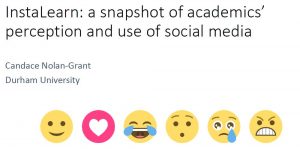Candace Nolan-Grant – Durham University
Original presentation
Short paper – Abstract
Research into academics’ use and perception of social media in higher education has often begun with the hypothesis—or assumption—that social media is beneficial to learning (Rambe and Nel, 2015). The focus is frequently on encouraging practitioners to engage with social media or on removing barriers to its use (Brown, 2012). This study was predicated on a neutral view of the use of social media in learning and teaching in higher education in order to garner academics’ opinions as objectively as possible.
Participants were academics at a UK university business school. A survey was used to gather self-reported information on past and current uses of social media in learning and teaching and in other contexts, and to ascertain respondents’ perceptions of the efficacy of social media in their own teaching and in teaching practice in their field generally. Interviews were conducted with a small number of respondents in order to complement the survey results.
Survey data indicated that the majority of respondents used social media in some capacity, with more than half having incorporated it into their teaching. Media sharing platforms such as YouTube were the most commonly used for teaching, and the interviews revealed a number of insights into their predominance. When comparing perception to experience, positive correlations were found between the extent of educational use of social media and perception of social media in learning and teaching. Respondents were most positive about the new methodological possibilities that social media entailed, while wary of getting distracted from the main learning objectives.
This paper will explore key findings from the survey and interviews, and will also incorporate results of a separate survey of students (JISC Student Digital Experience Tracker 2017) at the same institution. Of interest to both academics and learning technologists, this paper should inform expectations, course development, and skills enhancement around social media in higher education.
References
Brown, S. (2012). Seeing Web 2.0 in context: A study of academic perceptions. The Internet and Higher Education, 15(1), 50-57.
Rambe, P. and Nel, L. (2015). Technological utopia, dystopia and ambivalence: Teaching with social media at a South African university. British Journal of Educational Technology, 46(3), 629648.
Keywords
Attitude, Perception, Use, Academics, Survey, Research, Media sharing, Skills, Experience, Privacy
Relation to the theme
building staff and student digital capability and confidence
